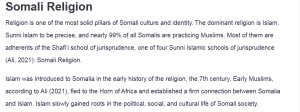Somali Religion
Religion is one of the most solid pillars of Somali culture and identity. The dominant religion is Islam, Sunni Islam to be precise, and nearly 99% of all Somalis are practicing Muslims. Most of them are adherents of the Shafi’i school of jurisprudence, one of four Sunni Islamic schools of jurisprudence (Ali, 2021): Somali Religion.
Islam was introduced to Somalia in the early history of the religion, the 7th century. Early Muslims, according to Ali (2021), fled to the Horn of Africa and established a firm connection between Somalia and Islam. Islam slowly gained roots in the political, social, and cultural life of Somali society.
Religious Practices and Beliefs
Five daily prayers (Salah) are a component of Somali life that is undertaken five times a day. Fasting for the whole holy month of Ramadan is also practiced extensively, as is giving alms (Zakat) to the needy. A great many Somalis also undertake Hajj, or the pilgrimage to Mecca, as a religious duty.
Notably, Islam dominates the majority of Somali life, including marriage, family, and law. For example, the Somali traditional wedding has Islamic ceremonies, and the marriage contract is written in accordance with Islamic laws.
Role in Healthcare and Everyday Life
Islamic values also guide healthcare practice and decisions to a large extent. For example, the majority of Somalis would desire that their treatments be informed by Islamic doctrine and may seek spiritual healing through Quran recitals or prayers. Modesty is also essential; this is highly achieved at hospitals, where patients may desire healthcare professionals of the same gender (Ali, 2021).
Role of Religion in Somali Culture
Not only is faith individual but also communal. Mosques are centers of communal life where individuals participate in spiritual, educational, and social activities. Islamic themes are often found in Somali poetry, oral tradition, and music, an indication of how the religion has infused all aspects of Somali life.
In summary, Somali religion is not only a source of spiritual guidance but also cultural identity and common ground. This strong connection to Islam is a necessary one in order to effectively work with and respect Somali individuals and communities.
References
Ali, A. A. (2021). Understanding the Somali Church. Kenya Projects Organization [KENPRO]. http://repository.anu.ac.ke/handle/123456789/683
ORDER A PLAGIARISM-FREE PAPER HERE
We’ll write everything from scratch
Question
CULTURE PROJECT
*Use of Artificial Intelligence (AI) to complete this assignment is strictly prohibited.

Somali Religion
* Writes about Somali religion.

